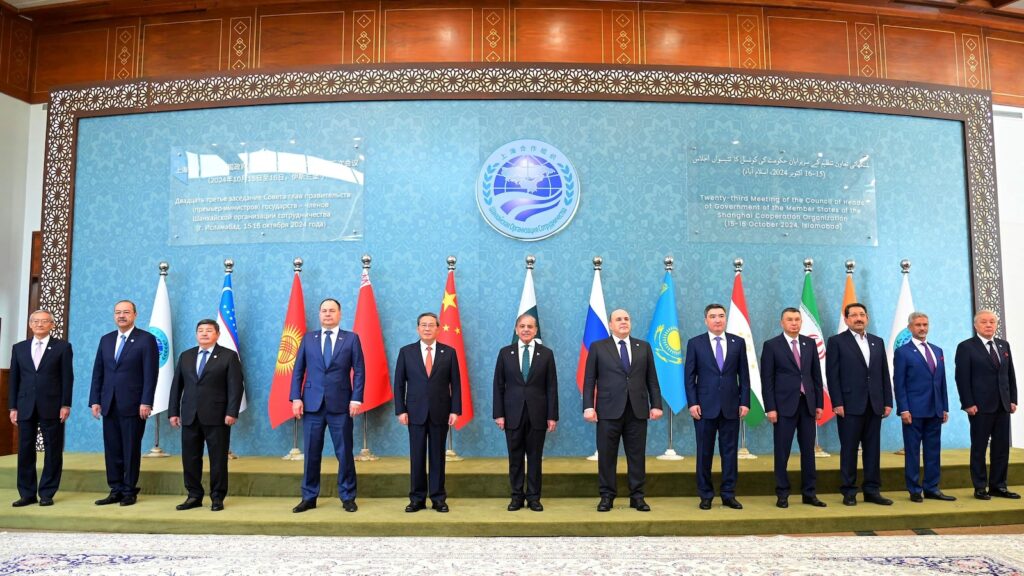ISLAMABAD — Leaders and top officials from an international group founded to counter Western alliances met in Pakistan’s capital Wednesday, with Moscow and Beijing announcing they will boost cooperation.
The 23rd meeting of the China-and Russia-founded Shanghai Cooperation Organization was held amid tight security in Islamabad, virtually on lockdown, and attended by leaders including Chinese Premier Li Qiang, Russian Prime Minister Mikhail Mishustin, Indian External Affairs Minister Subrahmanyam Jaishankar and the prime ministers of Kyrgyzstan, Belarus, Kazakhstan, Tajikistan and Mongolia.
According to Russian state news agency Tass, Mishustin said during a meeting with Li on the sidelines of the gathering that “despite unprecedented external pressure,” both countries are “increasing the volume of mutual trade and launching joint investment projects.” He also said they are “creating new international transport corridor … and strengthening food security in Russia and China.”
The Chinese premier said Beijing was willing to work with Moscow to strengthen strategic coordination, expand cooperation and contribute to the development and revitalization of the two countries, reported the official Xinhua News Agency.
The member state leaders attending the SCO meetings called for enhanced cooperation in the fields of security, trade, and health, minimizing the impacts of climate change and boosting people-to-people contact.
Jaishankar, India’s foreign minister said the objective of the SCO is to “strengthen mutual trust, friendship and good neighborliness,” adding that “if trust is lacking or cooperation inadequate, if friendship has fallen short and good neighborliness is missing somewhere, there are surely reasons to introspect and causes to address.”
The two countries have had a history of bitter relations since the end of British colonial rule on the Indian subcontinent in 1947, which led to the India-Pakistan Partition.
Meanwhile, Attaullah Tarar, Pakistan’s information minister, boasted on state-run Pakistan Television of organizing “the international event” within years of joining SCO, “in a safe and secure and conducive environment.”
Over a week ago, two Chinese engineers were killed in a suicide bombing claimed by an outlawed separatist group that opposes Chinese-funded projects in Pakistan.
Thousands of Chinese nationals work in the South Asian country on projects related to the China-Pakistan Economic Corridor, part of China’s Belt and Road Initiative which aims to reconstitute the Silk Road trade route and has seen Bejing building power plants, roads, railroads and ports around the world. It is a major part of President Xi Jinping’s push for China to play a larger role in global affairs.
In his opening remarks, Pakistan’s Prime Minister Shehbaz Sharif called for expanding the initiative and the China-Pakistan Economic Corridor, focusing on roads, railways, and digital infrastructure.
He also said stability in Afghanistan was vital to realize an “invaluable and rare opportunity for trade and transit” that would benefit SCO members. He urged the Taliban government in Kabul to ensure “Afghan soil is not misused for terrorism against its neighbors by any entity”.
Sharif’s remarks came amid a surge in violence in Pakistan, for which Islamabad blames militants based in Afghanistan. The Taliban has denied the charge.
In a joint statement, the SCO meeting said member states reaffirmed their intention “to further develop cooperation in the spheres of politics and security, trade, economy, finance and investment, and cultural and humanitarian ties in order to build a peaceful, safe, prosperous and ecologically clean planet Earth to achieve harmonious coexistence of man and nature”.
It said leaders and officials from Belarus, Iran, Kazakhstan, Kyrgyzstan, Pakistan, Russia, Tajikistan and Uzbekistan had reiterated support for China’s One Belt, One Road initiative. They also vowed “to cooperate on climate change and overcome its negative consequences.”
Sharif said the next meeting of the SCO — established in 2001 by Moscow and Beijing — will be held in Russia in 2025.
___
Associated Press writers Ashok Sharma from New Delhi, India and Ken Moritsugu from Beijing contributed to this report.
